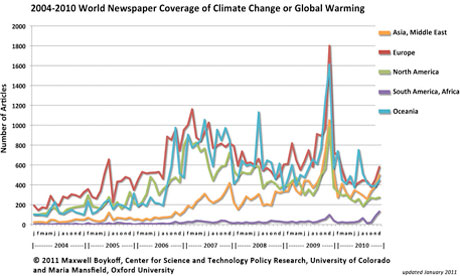Why have UK media ignored climate change announcements?
Yesterday's announcement that 2010 tied for the warmest year ever recorded on Earth was ignored by nearly all UK media outlets. How can this be?


Believe it or not, record warming of the Earth no longer seems to be news as far as the UK media are concerned.
Yesterday, both NASA and the US National Oceanic and Atmospheric Administration (NOAA) announced, based on independent analyses of global weather station data, that 2010 tied with 2005 as the warmest year on this planet since annual records began in the late 19th century.
But this news was ignored by all of the UK's national newspapers, apart from The Guardian, online and in print. (The Guardian's piece was followed, almost a day later, by The Telegraph online.)
True, these announcements were made in the US, in late afternoon UK time, so they may not have been on the radar of many British news desks as these approached the deadlines for their printed editions. But that does not explain the lack of online coverage.
NOAA and NASA are world authorities on the global climate, and most of the news agencies in the US and elsewhere picked it up: The New York Times, Washington Post, Wall Street Journal, USA Today and Christian Science Monitor all ran stories.
Perhaps the UK media have a parochial bias in favour of the Met Office, the world's other leading authority on climate. It has yet to announce the results of its analysis of the 2010 temperature record.
Unlike NOAA and NASA, the Met Office considers 1998, not 2005, to be the warmest year on record so far. This mismatch is due to differences in the way the three organisations analyse the data provided by national weather services around the world and take into account areas where no weather stations are located.
But a world record is a world record, no matter where it is announced. So why the news blackout in the UK?
Perhaps news editors felt the UK public was not ready to believe that 2010 was actually quite warm after a record-breaking cold spell in Britain in December. Certainly, some self-proclaimed climate change sceptics have tried to give the impression that the weather in the UK, which covers less than 0.05% of the Earth's surface, provides an indicator of global climate. Maybe news editors do not fully appreciate the difference between local weather and global climate?
Or maybe they are unwilling to believe any evidence collected by climate scientists following the hullabaloo over the email messages hacked from the University of East Anglia's Climatic Research Unit. Although sceptics claimed the emails represented the smoking gun from a worldwide conspiracy by scientists, four independent inquiries found no evidence of any fraud or serious misconduct. But maybe news editors harbour lingering suspicions?
I hope, however, that the real reason is that news editors now understand, and think most of the public also know, that global warming is happening, and that the Earth's temperature will carry on rising as long as humans continue to pump greenhouse gases into the atmosphere.
As The Observer reported a few weeks ago, another record was set in 2010: the concentration of carbon dioxide in the atmosphere reached 390 parts per million, a figure almost 40% higher than it was before we started burning fossil fuels for industrialisation, and a level not seen on Earth for at least 800,000 years.
But for the rest of the UK media, it seems that was not news either.
• Bob Ward is policy and communications director at the Grantham Research Institute on Climate Change and the Environment at London School of Economics and Political Science







No comments:
Post a Comment